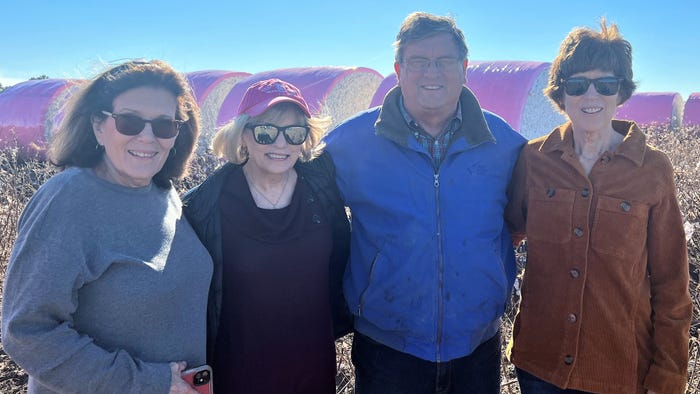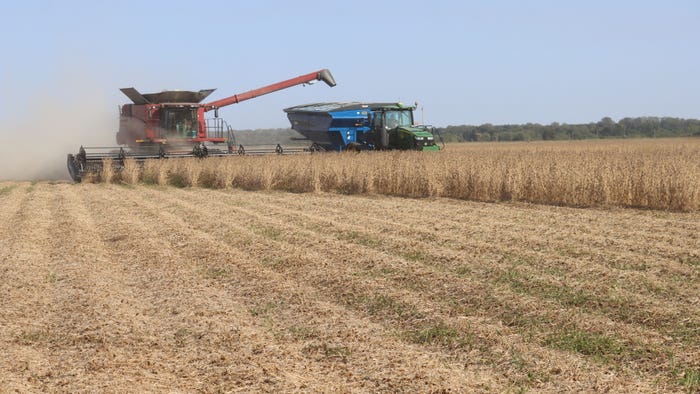
It could be the beginning line of a joke — “a teacher, nurse and retired farmer stand in a cornfield” — but it is not. They are Justin Rone’s landlords, his partners for raising identity preserved crops in the Bootheel of Missouri.
“These are the people that drive the decisions I make,” the Pemiscot County farmer explains. “I want to make sure that we get them a return on their investment, and their largest investment and asset is the land I farm.”
Rone, who spoke at the Identity Preserved International Summit, incorporates identity preservation, or IP, with his crop management strategy to increase those returns. He — along with his wife, parents, sisters and brother-in-law — raises cotton, rice, soybeans, corn and wheat near Portageville, Mo.
The family owns land but uses sharecropping, renting land from a landowner in return for a portion of the crop, to expand their acreage footprint. In this scenario, the three receive about one-third of every soybean bushel, Rone explains.
“Every year,” he says, “I’m thinking about how I can get them a 3% to 4% return on their asset.”
Start of identity preserved production
The Rone family had been raising a version of identity preserved crops before it became a movement in the agriculture industry. Rone’s father grew non-GMO soybeans for years.
They tried Roundup Ready soybeans for a time, but when the herbicide started losing its efficacy in the south, Rone made a crop management choice.

TEAM APPROACH: Justin Rone involves his farming partners or landlords early in the crop management process. He says transparency helps keep everyone moving in the same direction when it comes to decisions. A few of his partners include (from left) Susan Creel, Deborah Stout and Mary Kate Stout, pictured here with his Justin’s father, Lewis Rone (center).
“We were relying on different modes of action, different residual programs, and layering residual programs,” he explains. “We found that we could do the same with non-GMO soybeans that we were doing with Roundup beans.”
The difference? There were premiums offered in the non-GMO market, he says.
Securing that added value for a crop starts with a contract.
Develop IP market contacts
Finding the right identity preserved market can take time. Merchandisers and retailers work with farmers to provide the variety of crop to match individual farm acres to yield the best price. The contract time length can vary. Rone says building relationships is key.
For the past 12 years, the farm has been raising the same company’s soybean seed. “It is the right seed that performs well in our location on our acres,” he notes.

SPECIFIC HARVEST: In southeast Missouri, commodities such as soybeans, rice and cotton all offer identity preserved opportunities. Missouri soybean grower Justin Rone raises seed beans for a private company. He is looking at options in rice and cotton in the coming years to diversify his IP offerings to buyers.
There is extra management for raising identity preserved products, like long-term farm planning for crop rotation. “I can’t grow the seed beans behind beans,” Rone says. “I have to make it fit in the operation as far as what returns on corn, returns on rice, returns on cotton are, so that I can get the best returns for my landlords in the process as well.”
Grain setup is another factor to consider. Rone does not have large grain legs on the farm as it is one area that can cause contamination. Storage bins are generally smaller, allowing for separation of commodities. There is also additional time required for cleaning equipment and bins.
“Raising IP crops is not for everyone,” says Rone, who serves as a director on the Missouri Soybean Merchandising Council. “You need to look at it from your own perspective and see if it works in your farm system.”
Farming is a business, and Rone has partners that look at the bottom line. During times of lower commodity prices, he notes, “That extra revenue really helped make a difference on the farm.”
However, he manages revenue expectations with landlords.
IP profits are not guaranteed
“You want your landlord to be aware of what is happening on the farm and with the crop,” Rone explains. “You want them to be comfortable with the fact that they're going to share in the premium, but you want to also be honest about what and how much they're going to share.”
While landlords may focus on the premium price, they also need to see the costs — whether seed, chemical or even transportation and storage fees — to the farmer. Rone goes a step further and explains potential crop situations that could impede realizing that added value.
For instance, to raise high-quality soybeans, Rone waits until the first planting window in April. It is a risky move with Missouri weather as farmers can face excessive rains keeping them out of fields. If that happens, there is a need to replant. But the reward for quality often outweighs the risk.
Farmers and landlords need a written arrangement outlining expectations.
Expanding IP for future of farm
Cropland in southeastern Missouri is prime ground for growing cotton and rice. Rice already has aspects of identity preservation without the namesake.
Rice is segregated by variety, Rone explains, primarily to maximize milling. There are different types of rice — medium grain and long grain grow well in this region of the nation. However, domestic and international rice buyers are looking to up the ante with their own specifications including climate-friendly production practices.

WHY I FARM: The sustainability of the farm for the future generations matters to Justin Rone, whose desire is to pass on the family business to his children — Jack and Violet.
“Going forward, there are a lot of opportunities being presented for a significant premium for identity preserved rice and cotton as well,” Rone says. “It is all about traceability, identity and meeting contractual obligations. That is how farmers can realize premiums.”
Often, those premiums are significant with a chance to capture up to 25% premium on the rice crop.
Every year, while some farmers make tough choices that affect other family members and employees, Rone spends hours investigating options with one more group in mind — a schoolteacher, a nurse from Texas and a retired farmer.
“Farm decisions are not easy,” he says, “but these individuals drive my decision making not just for the current year, but for years to come. I want to make choices that benefit both parties to sustain a long-term relationship.”
About the Author(s)
You May Also Like






